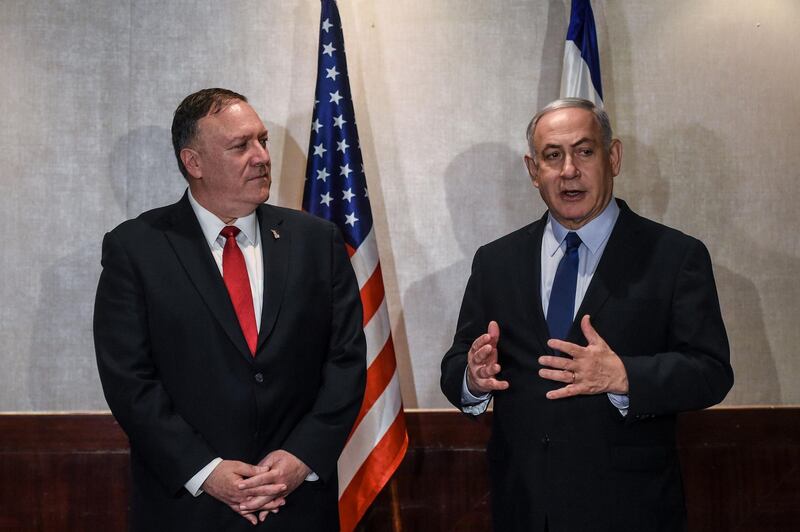US Secretary of State Mike Pompeo is flying to Israel on Tuesday, despite most of the world being under travel restrictions, to discuss challenges ahead before the inauguration of the new Israeli government.
Mr Pompeo’s first trip since the coronavirus lockdown follows a deal between Israeli Prime Minister Benjamin Netanyahu and Speaker of the Knesset Benny Gantz, who will oversee the swearing-in of the Cabinet on Thursday.
The secretary of state is due to meet both on Wednesday.
Talk of Mr Pompeo's trip has focused on Israel's large-scale annexation plans in the West Bank, but a US official told The National that Israel's growing ties with China and Iran's regional threat will also be on the agenda.
He repeated that the annexations, which could be decided by the government as soon as July, would be an Israeli decision.
"I want to understand how the new leadership, the soon-to-be new government, is thinking about that," Mr Pompeo told Israel Hayom newspaper.
But at the same time, he said he hoped for a resumption of negotiations between the Israeli government and the Palestinian Authority, which could delay annexation.
“We hope that we can convince the Palestinian leadership that they should engage with the Israelis on the basis of the Vision for Peace,” Mr Pompeo said.
He was referring to US President Donald Trump’s Middle East peace plan, which was released in January and greatly favoured Israel.
However, the secretary of state has no planned meeting with Palestinian Authority officials scheduled during the visit.
Also on Mr Pompeo’s agenda will be growing Israeli business ties with China, now seen as the global arch-rival to the US.
"One of the preliminary takeaways from this [Covid-19] crisis is that we have to be more cautious in our dealings with China," US assistant secretary of state for Near Eastern Affairs, David Schenker, told Bloomberg last week.
Mr Schenker will be accompanying Mr Pompeo on this trip.
“There are firms out there that are desperate for capital and could become targets for predatory investment,” he said.
Trade between China and Israel passed $11.8 billion (Dh43.34bn) in 2019.
The US has voiced particular concerns about the world's largest desalination plant, which a Chinese company is planning to build in southern Israel.
“Some of our partner nations have taken steps to bolster investment-screening efforts of late but Israel could also be well advised to add some of these mechanisms as well,” Mr Schenker said.
Iran’s arms embargo and the coming renewal of the UN Interim Force in Lebanon, due to be in coming months at the UN, are also expected to be discussed during Mr Pompeo’s visit.
Israel and the US have been pushing for a more aggressive mandate for the UN force in Lebanon, which would allow it to stop weapons smuggling to Iran-backed Hezbollah, or threaten to cut its budget.
The US is also pushing to extend the UN arms embargo on Iran, due to expire in October, despite objections from Russia and China.
While there is no planned meeting with the Palestinian leadership and relations are generally strained, the administration has sent $5 million in previously frozen aid to help it address the Covid-19 crisis.







